Growing Power is a non-profit organisation based in Milwaukee, Wisconsin, established to promote education of young people from poorer backgrounds, in the field of sustainable urban agriculture. It was first set up in 1995, although it was only in 1997 that the program gained its own premises from which to educate the community.
In 1997, the organisation joined forces with Will Allen, a former professional basketball player from the Miami Hurricanes, who provided the premises upon which to build a new community food centre. With the involvement of young people and trades people from the local area, Growing Power was able to transform the run-down greenhouses on an abandoned 2-acre plot of land in North Milwaukee, by attracting the necessary funding through sponsorship by local businesses and government through the program. The ethos of Growing Power is in low-tech, organic farming which is accessible to all, and a commitment to continuous self-improvement to be highly-productive.
The community food centre, located in Siler Spring Drive, now serves as the headquarters for Growing Power Inc. with outreach to a number of urban agriculture sites and food community centres across the city. The organisation maintains strong links to the local community, through youth programs, school community gardens, and local commerce, to which food produced on-site will be redistributed and sold.
Within the centre, the organisation is able to offer training, active demonstrations, outreach and technical assistance to thousands of visitors each year, who come from all over the US, as well as from the local community to learn how to grow, process, market and distribute local produce within a local area.
The centre and its surrounding food movement can be seen as a ‘remediator’ of wider social problems, targeting pertinent community and global issues of Food Deserts, High Unemployment, Landfill-Destined Food Waste and High Crime Rate.
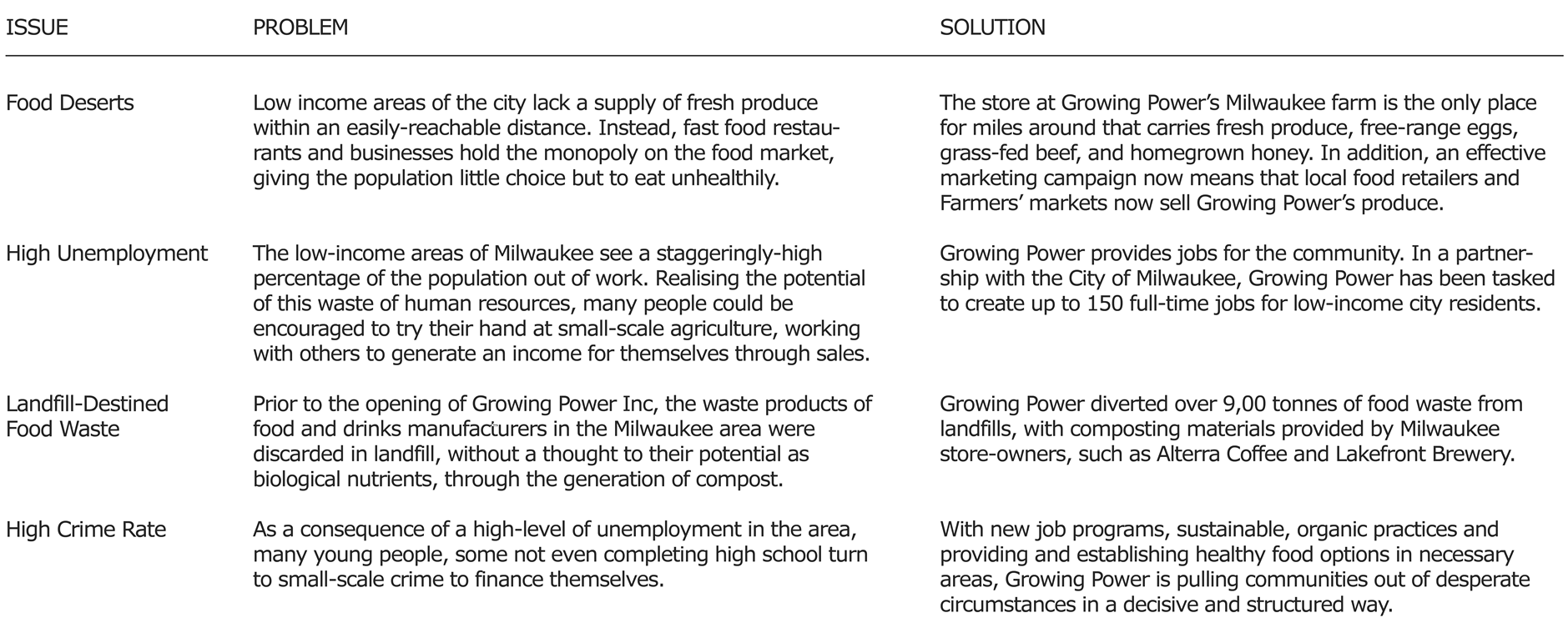
A ‘remediator’ of wider social problems
The first stage of the four-step process with which Growing Power encourages the establishment of local food systems is through the adoption of intensive local urban agriculture. This takes place through the creation of seed nurseries, capable of initiating the growth of new plants for distribution into the community. In order to maximise yields, but limit damage to the environment, it is first important to establish a sustainable source of organic fertiliser and compost to maintain consistently high productivity.
In order to market a product successfully in a number of local food retail centres, good presentation and quality control will need to be established to ensure that consumers are confident when making the switch from the aesthetic-based supermarket produce. In order to achieve this, a facility will need to be provided for use by the community, where washing, quality control and packaging can all take place, to make the new product acceptable for distribution in local supermarkets.
Marketing at first will begin small, in line with production. However, once a number of urban agricultural sites have been established in the local area, it is essential to establish links to local centres of food commerce, and to create a good market demand for the new food produced. Work in the community with help educate local residents as to the benefits of locally-sourced food, and its availability. Once a market has been established, work in farmers’ markets, greengrocers and even supermarkets will ensure that there is a continuous supply to consumers.
Once a market has been created for the new product, it is important to distribute the product, along with suitable marketing to all local food centres, to get local produce out into the community. This includes all food retail centres such as farmers markets, greengrocers, convenience stores and supermarkets, or the creation of online food ordering, and delivery-to-door businesses. Such businesses will offer discounts to repeat customers who pay in advance for frequent deliveries of food boxes, thus generating capital for reinvestment into the business.
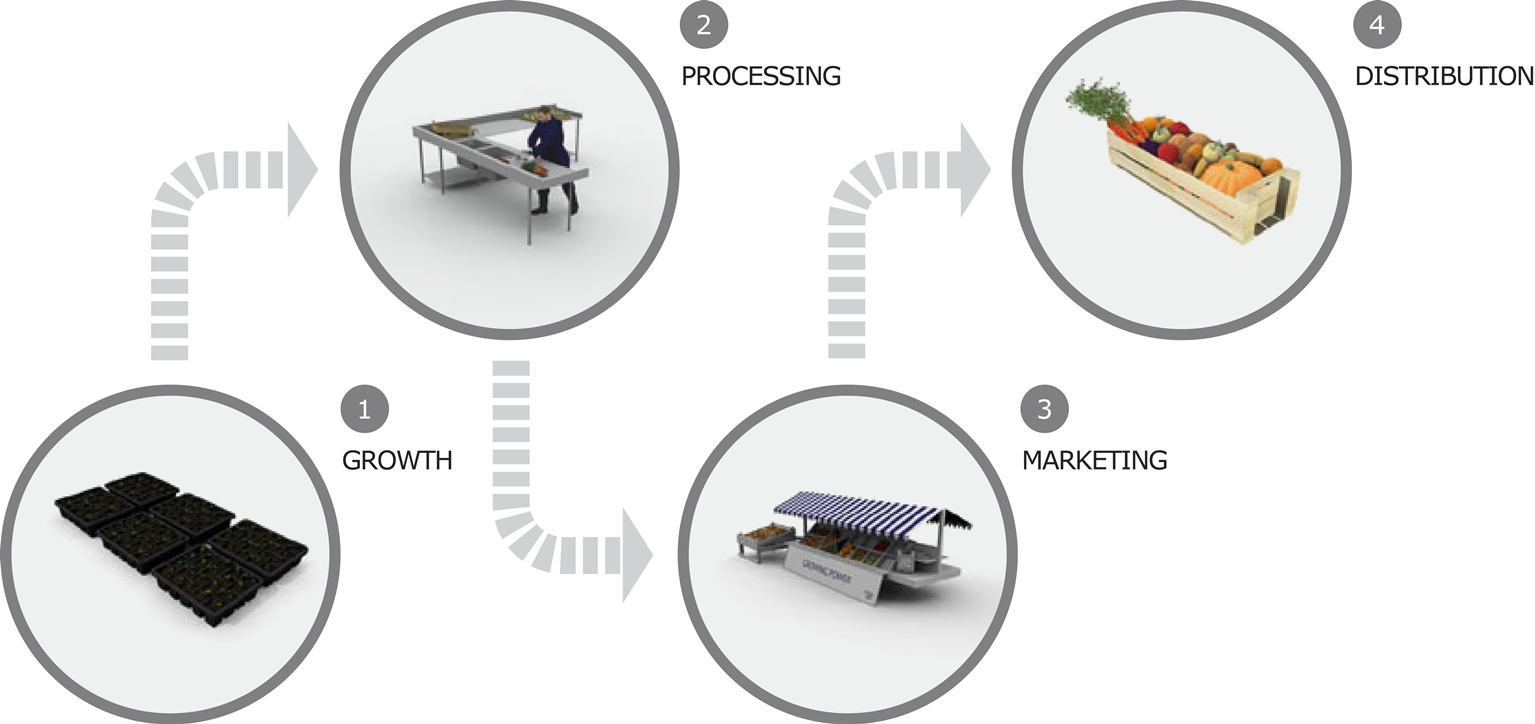
The Local Food Network | From Production to Distribution
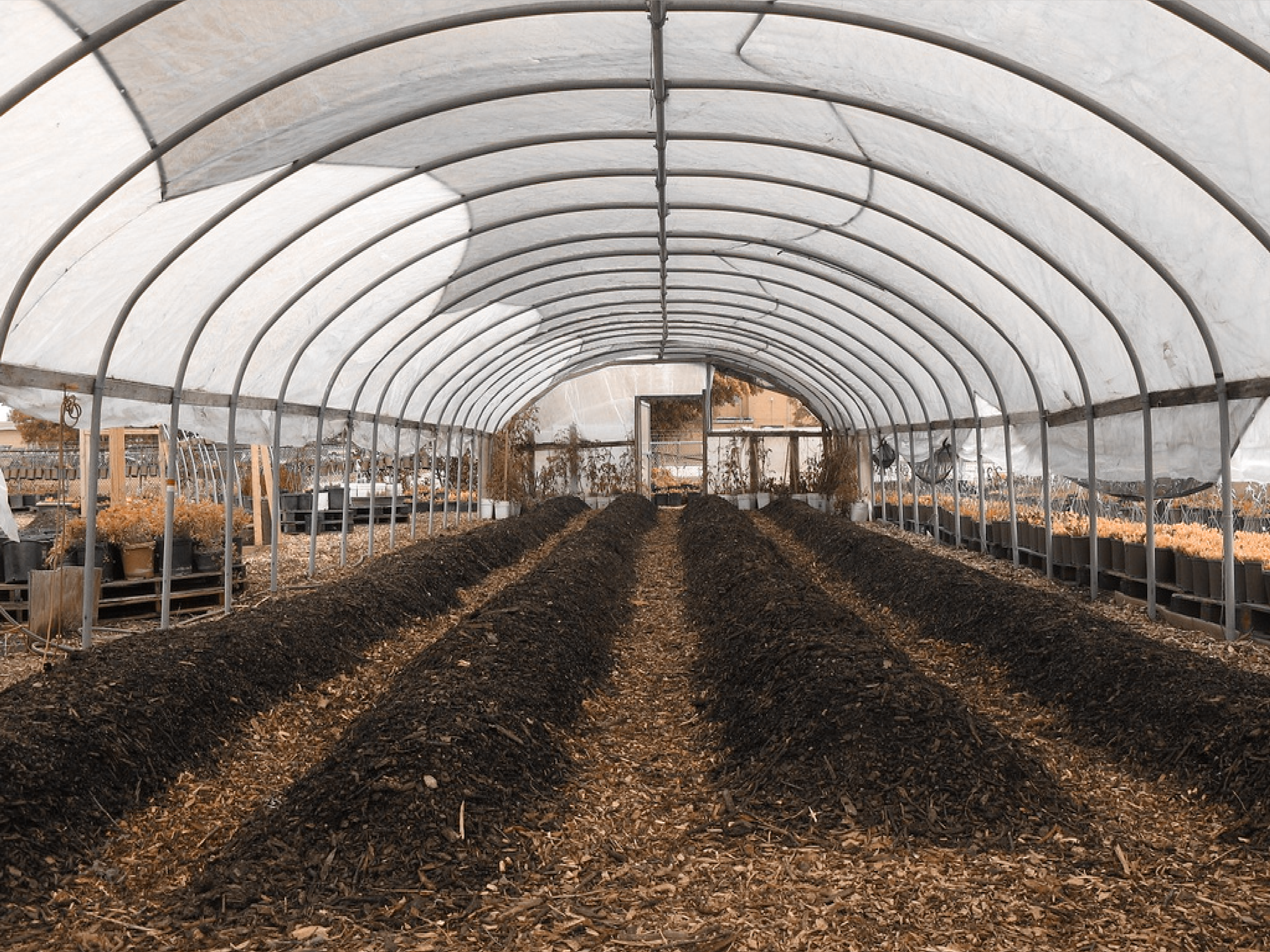
An estimated 9000 tonnes of food and organic waste are delivered to the site every year by Milwaukee shop-owners, restaurants, and local residents, which would otherwise have been destined for landfill.
The process of composting begins with the delivery of this food waste. On average around 500kgs of food and organic waste is delivered to the site every week, which provides the input for the composting on-site. The food waste delivered on site is first buried in large bins outside and covered to begin the process of pre-composting, with which heat is produced and pathogens and weed seeds are killed in the mixture. After a month or so, the mixture, already rich with nutrients is moved to bins inside where worms are added to increase soil fertility. The bins are once again covered for a month and are frequently watered and mixed to ensure that the soil is properly processed. After the month is up, ‘choer’ (grated coconut shells) are added to the mixture to provide a substrate upon which nutrients can settle, and tossed to allow oxygen into the mix. Grubs from insects attracted in the process also provide a good source of food for chickens reared at the centre, and so the reduce the demand for costly feed, saving the centre valuable capital.
The resulting mixture, which is rich in nutrients is then used to grow the fruit and vegetables on-site, with the remaining 30 percent packaged and sold the local community as MBG, short for ‘Milwaukee Black Gold’.
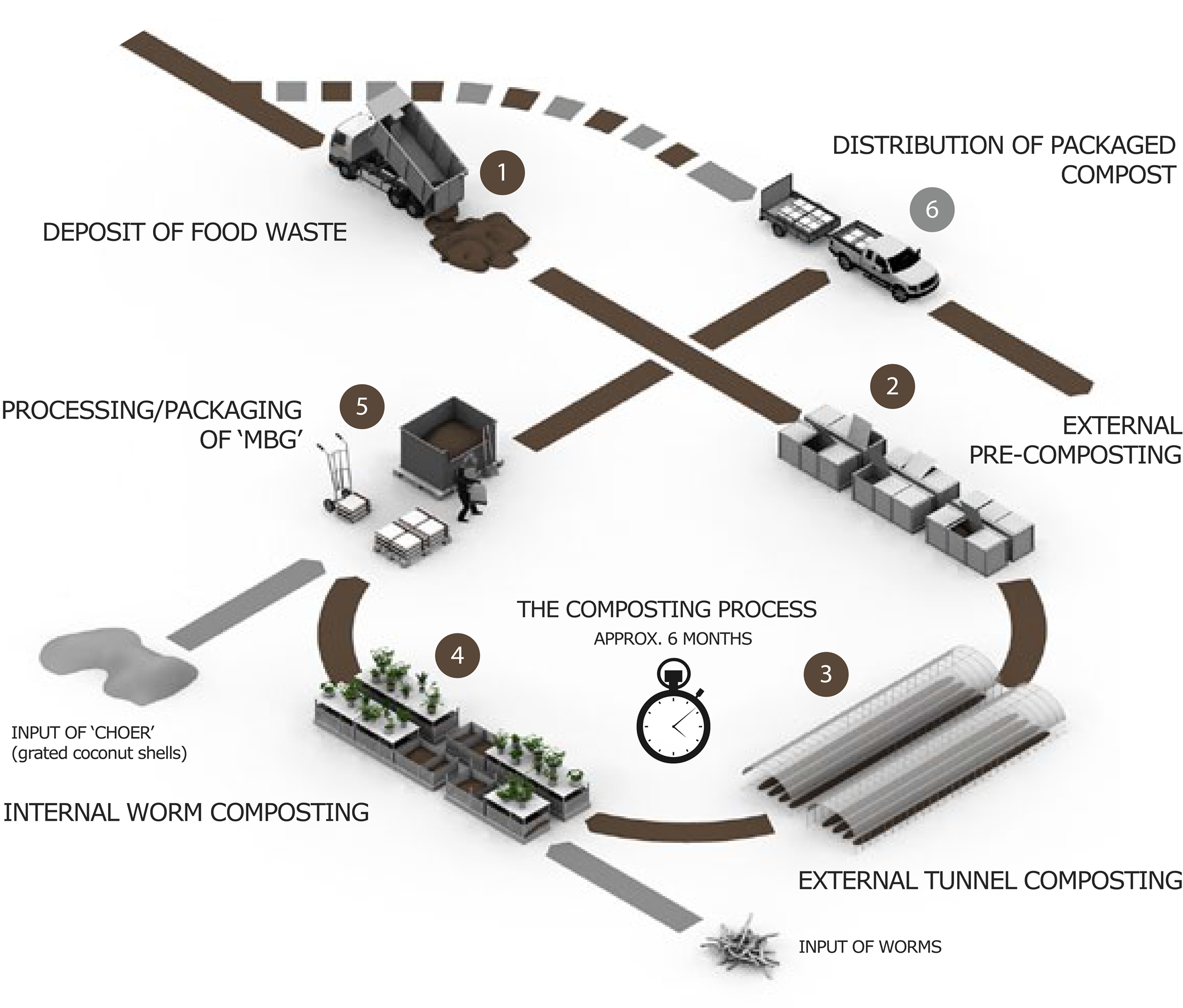
The Composting Process | 6 Stages from Waste to Compost
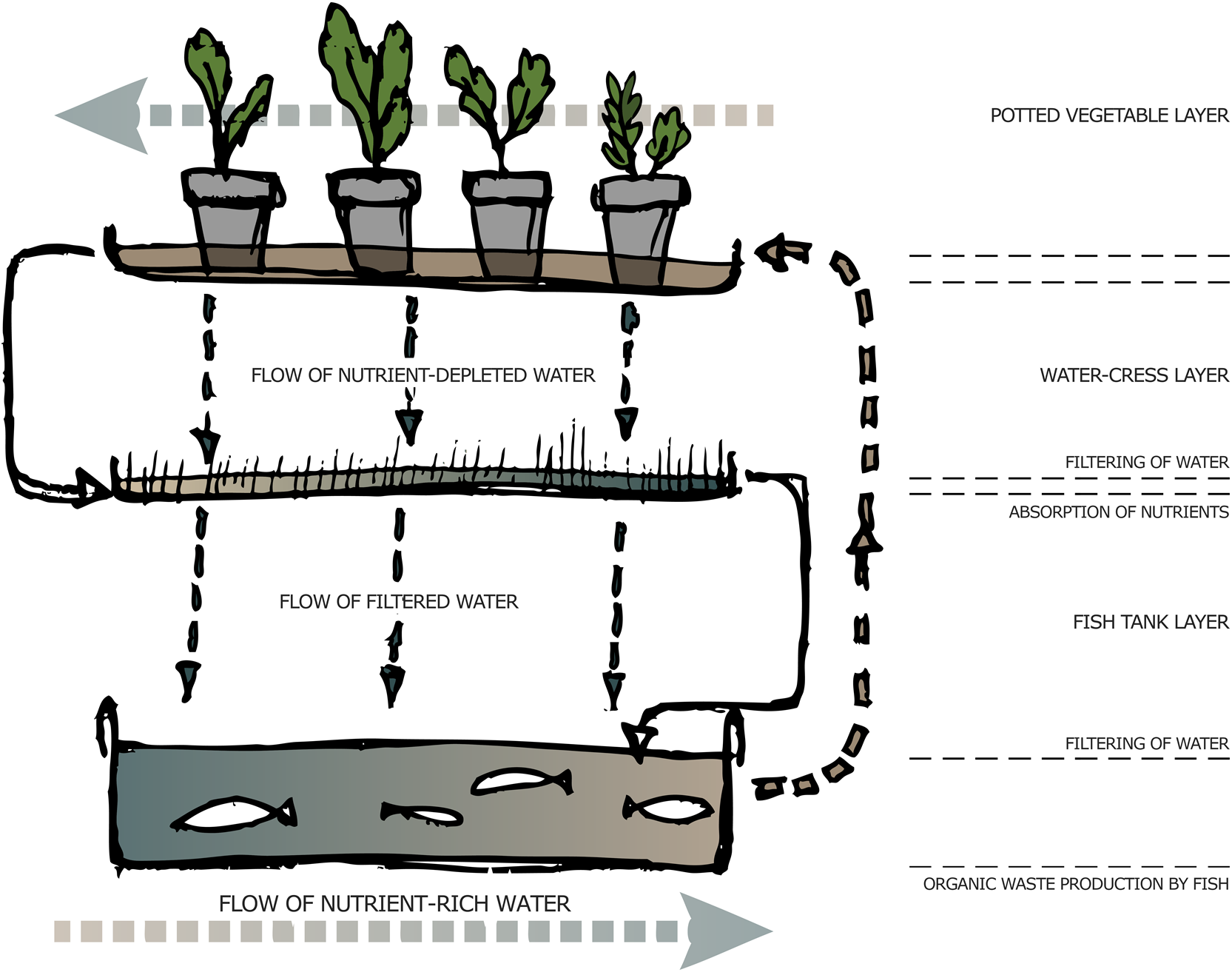
Another low-tech method of sustainable food production adopted by the Centre is the process of aquaponics which allows the simultaneous production of plants and fish through a mutually beneficial relationship. The system is set up in a stacked format (shown right), where shelves of plants and vegetables are constructed above a number of tanks, in which the fish are reared. The waste water produced by the fish is pumped to the vegetable planting trays and pots above where it fertilises the plants, and at the same time is filtered by the soil, sending fresh water back down to the fish. Cress on an intermediate shelf has been identified as an ideal filter for the water, and can be sold as it is produced to local businesses to aid the income of the Centre.
The entire system mimics that of a natural river, and in the same way is able to fully sustain itself. Flies and other insects which can be bred with ease also supplement the diet of the fish, which further boosts this sustainable production of locally-sourced protein.
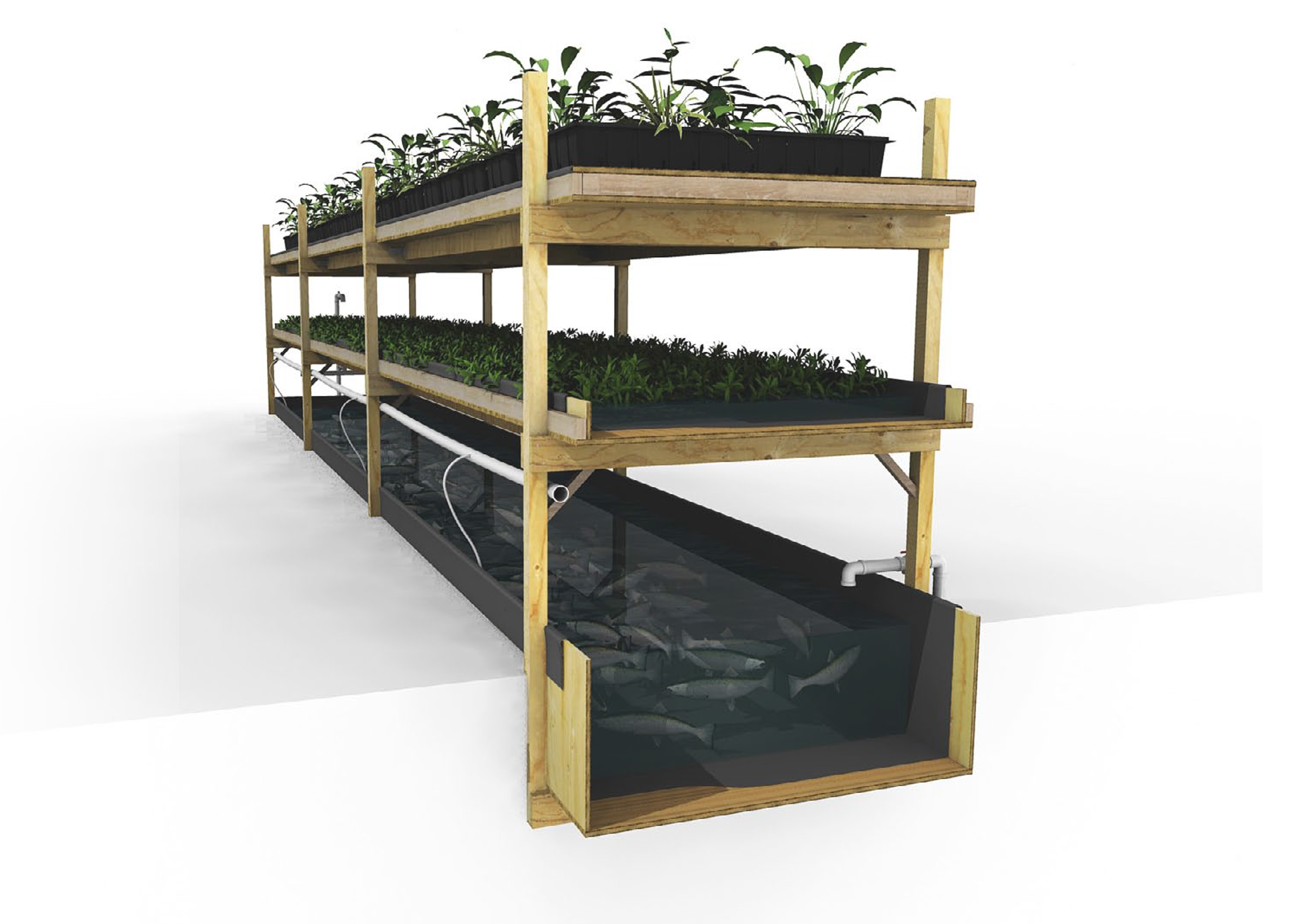
Aquaponics System | Self-Sustaining Food Production Process

As a key component of the city’s growing food movement, the provision of a wide range of educational programs and courses seeks to raise awareness of important issues relating to food production and distribution in the city, and also teaches valuable skills to raise employability of local residents. This fulfils a number of the objectives of the Milwaukee Food Movement. Courses offered by the two centres are geared towards teaching local residents important skills and techniques in local food cultivation, processing and preparation in order to promote healthy eating and sustainable food production.
A large part of the educational program is conducted outdoors in urban agricultural sites, such school or community gardens, or the city parks, bringing students closer to the subject matter through direct engagement in matters of environmental sustainability and food production.
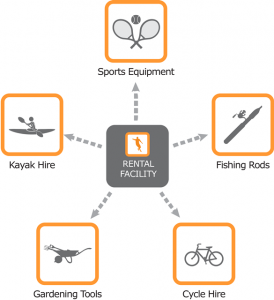
Identified as instrumental in promoting the growth of the urban agriculture movement is the ready access to necessary equipment, reducing the need for large investment to get started. This is especially important in the poorer areas of the city. A rental facility, allowing local residents to hire a wide range of gardening equipment for a nominal fee, not only generates income for the centre, but also provides a form of ‘tool-sharing’, allowing universal access to expensive equipment, which would otherwise be unavailable to all but the most wealthy of citizens.
The rental facility will comprise a gardening store, a cycle hire store, and a watersports hire centre, where it will be possible to hire anything from kayaks to fishing rods, for use on the city’s lakes and waterways.
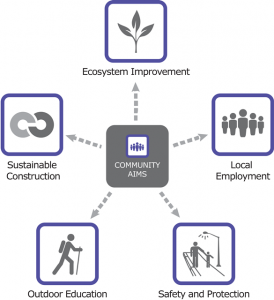
The partnership of the Urban Ecology Centre and Growing Power Inc. in Milwaukee’s emerging urban agriculture movement has set out a series of goals which respond to identified problems inherent in communities across the city.
In response to high levels of unemployment and rising crime rates, the work of the combined centres hopes to provide unemployment for youth in the growing local food and agriculture sector, which in turn will help to contain the spread of crime in poorer neighbourhoods across the city.
As a former industrial centre in the region, the city of Milwaukee suffered from the continued effects of environmental degradation, through industrial contamination. The project therefore aims to raise awareness of this issue through it new educational programs which devote a considerable amount of resources to practical outdoor education, where students can see the effects at first hand, which will help to engage the community with the issue.
The final objective of the movement looks to the future development of the city and the importance of employing new environmentally-responsible technologies in the construction of the expanding urban environment.

As non-profit organisations, both Growing Power Inc. and the Urban Ecology Centre depend on an effective marketing campaign to attract volunteers and visitors from the local and wider community, and investment from local and larger businesses, as well as authorities to ensure its continued success.
Part of the marketing campaign focusses its efforts on advertising a wide range of courses at the two centres, including farming courses, cooking courses, and other community-oriented activities. By appealing to all age groups, the centre is able to generate an income through course fees, offering discounts to membership holders, who pay upfront for a 6-month or 12-month contract. Awareness provided through its various educational programs encourages local residents to organise events in the community, with the aim of raising funds for the upkeep of the centres. Growing awareness, and increasing popularity of the food movement in Milwaukee, enables the centres to apply for funding from local and national governments, who donate a significant proportion of the centres’ overall incomes.
Follow the links below to explore other similar, related projects